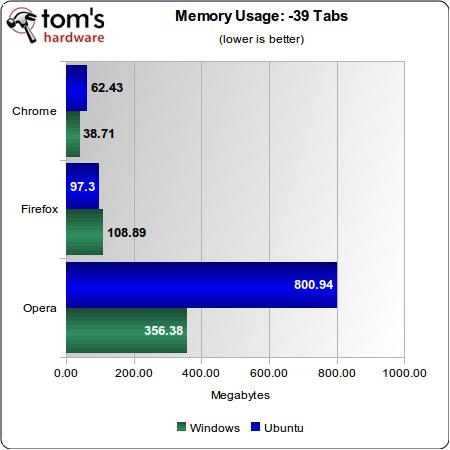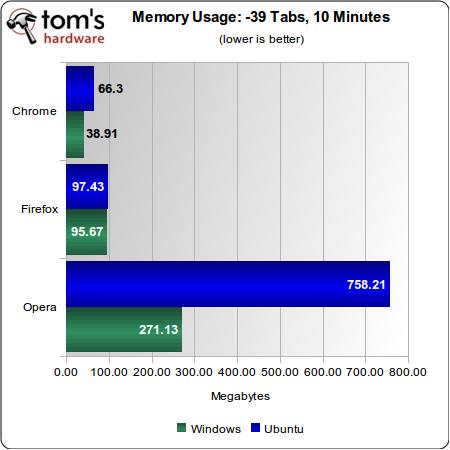Web Browser Grand Prix 2: Running The Linux Circuit
Last week we showed Opera 10.60 to be the world's fastest Web browser. That was in the Windows world. But where do Chrome, Firefox, and Opera stand in Linux? Today we find out. Adding the Win 7 results, we'll also learn which OS has the speediest browser.
Benchmark Results: Memory Management
On the last page we looked solely at memory usage, both with a single tab, and with a large load of 40 tabs. Now we're going to close the 39 tabs we opened for the 40-tab test. After five minutes we record the new memory usage totals. Finally we wait an additional five minutes and record a final number just to see if the usage drops over time.
-39 Tabs
After closing 39 of the 40 tabs from the last test, we're again left with the Google homepage in a single tab.
When returning to a single tab from 40, Google Chrome once again demonstrates almost OS-like memory management. Google's browser goes from almost 1.5 GB back down to just over 60 MB, just 15 MB more than before the additional 39 tabs were opened.
Firefox is a close second with just under 100 megabytes. Mozilla manages not only to beat its Windows 7 -39 tab usage by 10 MB, but it only holds onto a third of the 40-tab total. In contrast, it only gives back half in Windows.
Opera, on the other hand, has a big problem with memory management in Ubuntu. After closing 39 of the 40-tab load, Opera still hangs onto 800 MB of system memory, only returning 70 MB.
-39 Tabs, Another 5 Minutes
Get Tom's Hardware's best news and in-depth reviews, straight to your inbox.
After waiting an additional five minutes, the results remain the same. Both Google Chrome and Mozilla Firefox slightly increase in memory usage. Opera gives back only 40 additional megabytes, still holding onto over 750 MB.
Chrome obviously takes the top spot for memory management, just like in Windows, despite doubling its peak usage in Linux. Firefox achieves a close second, demonstrating big improvements to memory management in its Linux version. Opera tanks at memory management in Linux. The Norwegian browser gives back essentially none of the RAM it used with 40 tabs open.
Current page: Benchmark Results: Memory Management
Prev Page Benchmark Results: Memory Usage Next Page Benchmark Results: Standards Testing-
Tamz_msc The article that I was waiting for.How the tables have turned!Reply
Conclusion:Firefox is quite capable in both Linux and Windows.
I'm using Firefox 4 beta and I find it pretty quick. -
micr0be yes i would have loved to have seen the firefox 4 beta with the results. although great article.Reply -
adamovera weirdguy99Why not put firefox 4 into the equation?micr0beyes i would have loved to have seen the firefox 4 beta with the results. although great article.When it's final, I'll test it.Reply -
Tamz_msc DamdamanI'll get berated for this I'm sure but will we see an OSX article on browsers as well?You are kidding,right?Reply -
arnweb Opera Turbo feature, is not mentioned here, it can boost speed in real surf. And also when we open a closed tab in Opera it opens them instantly, that's why Opera holds memory for closed, tab.Reply -
Sihastru Opera still can't render pages properly, still can't print content properly, and we waste our time with senseless tests of imperceptible speed.Reply -
The_King I dont think anyone using firefox will change to another browser even if it is Faster. I love my firefox :)Reply -
Tamz_msc arnwebOpera Turbo feature, is not mentioned here, it can boost speed in real surf. And also when we open a closed tab in Opera it opens them instantly, that's why Opera holds memory for closed, tab.Opera Turbo increases page load times on slow connections.On my 2Mbps connection the time in which Opera Turbo connects to its servers is the time in which Google loads in Firefox.Reply

